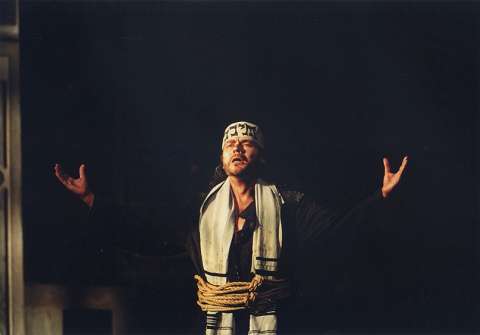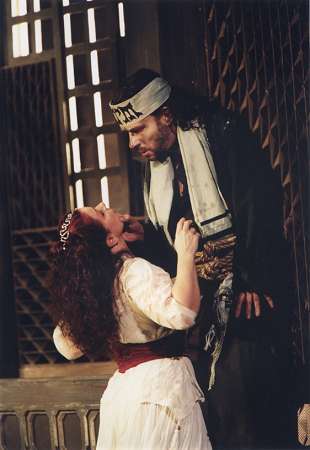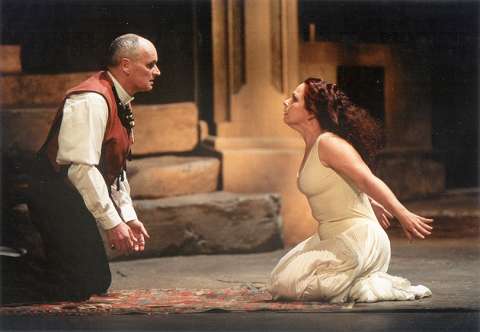|
<< -- 2 -- Roderic Dunnett A glorious dip in the grotesque

By and large, the production has shed none of its original eeriness.
The substitution of Robert Tear, a perfectly cast Herod, for the highly
capable but indisposed Robin Leggate, was an added bonus.

Dark, grim, its shadowy Topkapi windows casting a forbidding gloom ingeniously
lit up by André Diot, this was a palace where laughter is forced
and charity wafer-thin -- more a Bluebeard's den than the halls of a benign
and lavish monarch -- and where John the Baptist's dungeon cries, as widely
inspired as an Arkel or Titurel, sounded as ominous as a wild beast. Paradoxically,
Salome caresses not Jokanaan's body, but the ragged greatcoat that envelops
Matthew Best as he emerges, a haggard Elijah, from the gloom.

Rizzi's more cloudy layerings posed no problem for Best -- slim and statuesque,
albeit not exactly ivory or alluring (he sings Wotan the Wanderer in Scottish
Opera's new Siegfried at this summer's Edinburgh Festival) -- whose
voluminous bass cut through the thickest textures, or for Brazilian soprano
Eliane Coelho, a well-travelled Amelia (in Ballo in Maschera and
Simone Boccanegra), Leonora and Desdemona, who slices through brass
and woodwind to startling effect. Coelho has sung the role in Vienna and
Munich : you soon sense this Salome is barking mad : so what if the ill-fated
Narraboth's blackening blood flows chillingly across the flagstones? -- she
has other schemes afoot.

Robert Tear still makes a superb Herod, a sex-starved incipient geriatric,
wheedling to his unbeddable stepdaughter with ill-omened fruit and viticulture
to the pirriping of ironic woodwind, or leering with reedy and randy urgency
('Tanz fur mich') as she builds to the dance, revelling in Wilde's silvered
words and honeyed cadences, and coaxing her faltering steps like an ageing
Calibanesque faun. WNO regular Elizabeth Vaughan made a more than sufficient
foil as a nagging Herodias. The Jew and Nazarene disputations all fared
rather well, tenor pitted against tenor and baritone versus baritone (one
possibly spuriously wheelchaired), a clutter of disorganised rabbinic, hermitic
and hermetic opinions clawing at each others' hermeneutics.
If Strauss's score, like the wench, never quite danced sufficiently,
some of the WNO orchestra's tinkling detail did make it through to delight
the ear. Wheedlings of bass clarinet, bassoon and celesta (Schreker soon
took up the idea for Der ferne Klang, just as Szymanowski borrowed
others for Hagith and King Roger) as Salome teases Narraboth;
clarinet, then soughing flute, as disaster nears for him; snarly trumpets
as Jokanaan first rejects her; sinister (and here, soft) strings and sinuous
clarinet cadenza as Herod embarks on his wooing; flute twitters preceding
the fatal not-quite dance. What with Rieti's lunar eclipse looming through
the rear windows, terrifying and blood-red as Wozzeck, it
all made for a glorious dip in the grotesque.
Copyright © 5 May 2002
Roderic Dunnett, Coventry, UK
 WELSH NATIONAL OPERA
<< Music
& Vision home
Yoo Na Noh >>
WELSH NATIONAL OPERA
<< Music
& Vision home
Yoo Na Noh >>
|

